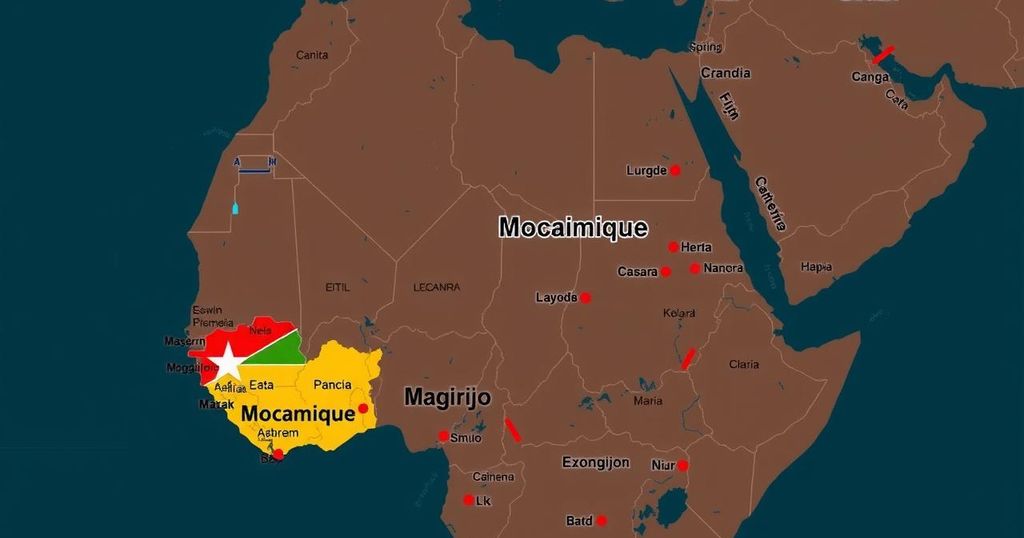The Regional Implications of Post-Election Violence in Mozambique

Post-election violence in Mozambique following the disputed October elections raises regional concerns for Southern Africa. Over 30 fatalities have been reported amidst ongoing protests against the ruling Frelimo party’s extended rule. The SADC summit is expected to address these tensions, reflecting broader challenges regarding electoral integrity and political stability in the region.
Following the recent disputed elections on October 9, 2024, Mozambique has seen an outbreak of violence as protesters challenge the results that extended the ruling Frelimo party’s grip on power for a 49th year. Over 30 fatalities have been reported, raising concerns among neighboring nations. The Southern African Development Community (SADC) summit will likely address the ramifications of this unrest. With significant precariousness stemming from Mozambique’s political climate, the situation demands careful attention from regional authorities. The credibility of elections in Southern Africa is under scrutiny, particularly as some nations, such as South Africa and Botswana, have successfully conducted fair elections this year. In Botswana, a historical transition of power occurred after 58 years of the ruling party’s dominance, while South Africa recently achieved a coalition government amid shifts in parliamentary power. However, Mozambique’s latest electoral process has drawn criticism from international observers, including allegations of result manipulation by the Frelimo party. Additionally, regional states like Zimbabwe have also faced challenges with electoral integrity, underscoring a broader issue of trust in democratic processes across the region. Mozambique’s stability is crucial for regional trade, sharing borders with multiple Southern African nations. The recent violence and subsequent closure of borders, as evidenced by South Africa’s actions along the Lebombo border, highlight the interconnected economic vulnerabilities within the region. Such instability can lead to significant economic losses for neighboring countries that rely on Mozambican infrastructure for transit, further complicating regional trade relations. The Minerals Council of South Africa estimated daily losses of R10 million (approximately $555,177) due to the border closure, illustrating the economic impact of political unrest. Historically, Mozambique continues to grapple with the fallout from its civil war and ongoing issues with insurgent groups in the northern Cabo Delgado province. The humanitarian crisis has displaced over 1.3 million people, with many struggling to return to their homes amidst devastated communities. Any continuing instability in Mozambique poses a risk to regional political dynamics and could further strain the relationship between countries, particularly as large segments of Mozambique’s population seek employment opportunities elsewhere in the region. In summary, the post-election violence in Mozambique highlights significant challenges applicable not only to the nation itself but also to Southern Africa as a whole. Political instability, the integrity of democratic processes, and economic implications are critical areas that require concerted regional efforts. The SADC summit’s outcomes will be pivotal in determining the future pathway for Mozambique and its neighbors as they navigate these pressing issues.
The article discusses the post-election violence that erupted in Mozambique following the disputed elections held on October 9, 2024. The ruling party, Frelimo, was declared the winner, leading to widespread protests and violence. The backdrop to this situation includes Mozambique’s history of civil conflict, its importance in regional trade, and the challenges of ensuring credible elections in Southern Africa. The regional implications of Mozambique’s instability are also highlighted, particularly regarding trade disruptions and the potential for increased migration due to political violence.
The escalating post-election violence in Mozambique not only impacts the country’s domestic stability but poses significant concerns for the Southern African region as a whole. The interplay of political unrest, issues of electoral integrity, and economic repercussions necessitates urgent attention from regional leadership. As Mozambique navigates these challenges, neighboring nations must remain vigilant due to the interconnected nature of their economies and populations.
Original Source: apnews.com







